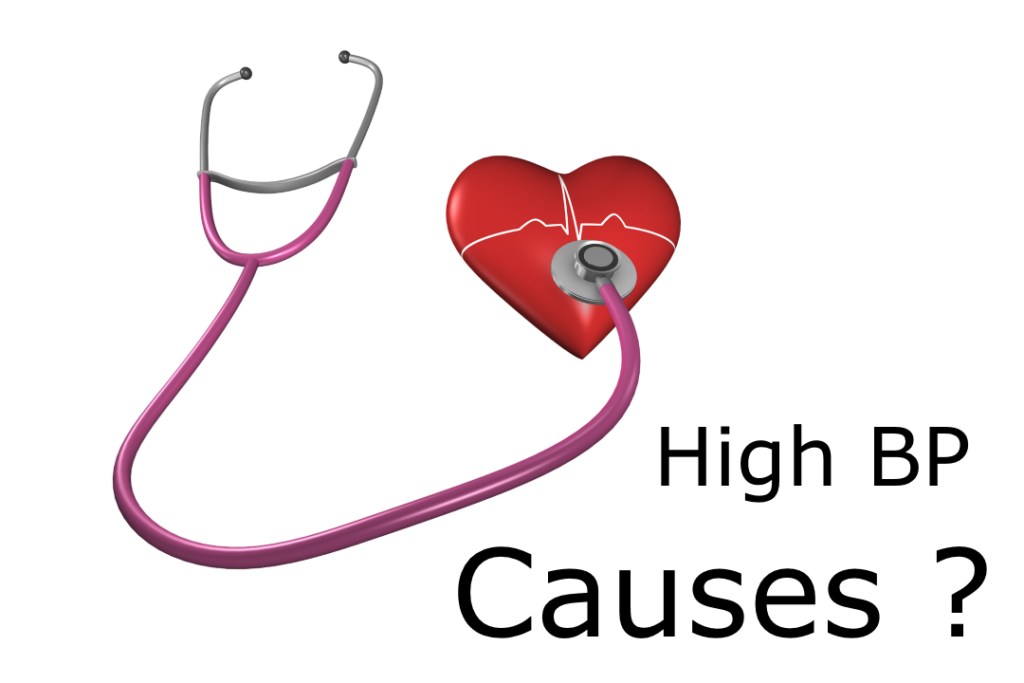
Contents
Reasons for high blood pressure
Based on its cause, hypertension is divided into 2 typesPrimary hypertension:
For many people there is no definite cause of high blood pressure. It is also known as essential hypertension.Secondary hypertension:
A small group of patients with high blood pressure have what is called secondary hypertension, in which the high blood pressure is the result of another condition or illness, such as kidney diseases, disorders of the thyroid, pituitary or adrenal glands, pregnancy, obesity and sleep disorders and adverse effects of medicines. There is no exact cause of high blood pressure, but there are various factors and conditions which develop hypertension.- Age: The older you are the higher your risk of having high blood pressure.
- Family: If you have close family members with hypertension, your chances of developing it are significantly higher. as you get older, the effects of an unhealthy lifestyle can build up and your blood pressure can increase.
- Overweight/Obesity: Overweight refers to having extra body weight from muscle, bone, fat and/or water. Obesity tends to refer just to having a high amount of extra body fat. Both overweight and obese people are more likely to develop high blood pressure, compared to people of normal weight.
- Gender: High blood pressure is more common among adult men than adult women.
- Lack of exercise: Having a sedentary lifestyle (physical inactivity) raises the risk of hypertension.
- Smoking: Smoking causes the blood vessels to narrow, resulting in higher blood pressure. Smoking also reduces the blood’s oxygen content so the heart has to pump faster in order to compensate, causing a rise in blood pressure.
- Alcohol intake: Drinking too much alcohol can raise blood pressure to unhealthy levels. Alcohol contains calories and may lead unwanted weight gain, a risk factor for high blood pressure. Also, alcohol can alter the effectiveness and increase the side effects of some blood pressure medications.
- High salt intake: Eating salt raises the amount of sodium in your bloodstream and wrecks the delicate balance, reducing the ability of your kidneys to remove the water. The result is a higher blood pressure due to the extra fluid and extra strain on the delicate blood vessels leading to the kidneys.
- High fat diet: Fats sourced from plants, such as avocados, nuts, olive oil, etc., as well as omega oils which are common in some types of fish, are good for you – while, saturated fats which are common in animal sourced foods, as well as trans fats are bad for you.
- Mental stress: Our body produces a storm of hormones when we are in a stressful situation. These hormones temporarily increase blood pressure by causing your heart to beat faster and blood vessels to narrow.
- Underlying causes: Medical conditions that can cause high blood pressure such as chronic kidney disease, sleep apnea, thyroid problems, or certain tumors. This happens because these other conditions change the way your body controls fluids, sodium, and hormones in your blood, which leads to secondary high blood pressure.
- Pregnancy: Pregnant women have a higher risk of developing hypertension than women of the same age who are not pregnant. It is the most common medical problem encountered during pregnancy, complicating 2% to 3% of all pregnancies.
- Medications: Prescription medicines such as asthma, birth control pills and over-the-counter medicines such as cold relief medicines may cause this form of high blood pressure. This happens because medicines can change the way your body controls fluid and salt balances, cause your blood vessels to constrict leading to high blood pressure.